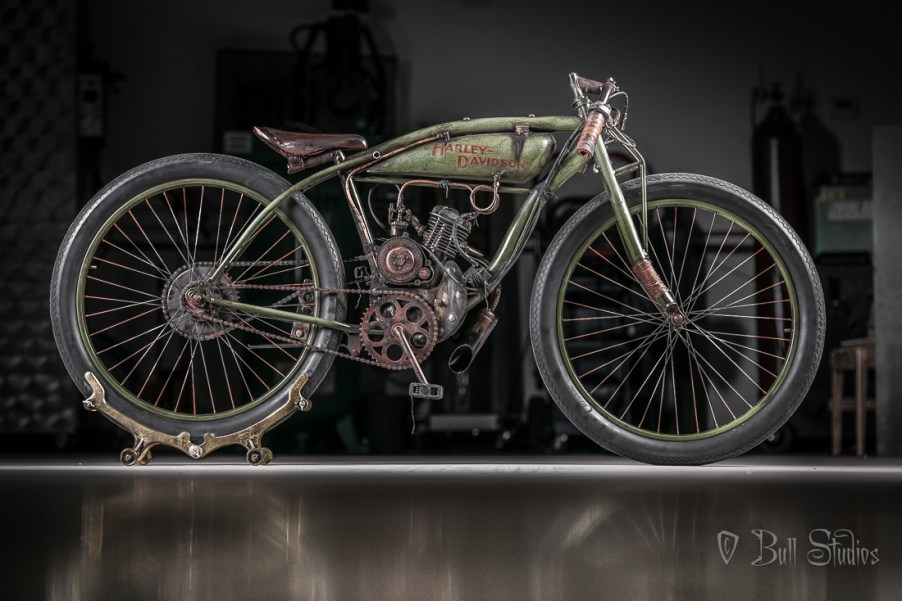
These Vintage Bull Cycles Board Track Racers Are Wild American Throwbacks
Today, there are plenty of motorcycles available that ape their classic ancestors. Janus Motorcycles even uses a frame design that originates in the 1950s. But vintage bikes are another story. The earliest motorcycles were literally bicycles with motors attached; that’s how Ducati got its start. Arguably, that makes modern e-bikes motorcycle throwbacks. However, if you’re after a truer-to-form look at the past, turn to Batavia, Illinois-based Bull Cycles. Its bikes are throwbacks to one of the earliest, and most dangerous, American motorsports: board track racers.
What are board track racers?

In the early 1900s, one of the most popular sports in the US wasn’t baseball. It was bicycle racing, specifically on wooden banked tracks called velodromes. These races were sometimes multi-day affairs, the Chicago Tribune reports—as in, the racers literally biked for several days straight. But the injuries and deaths meant these races eventually faded in popularity. Today, only a few American velodromes, like Detroit’s Lexus Velodrome, are still in operation.
However, as Classic Driver explains, by the 1910s motorcycles had started moving from curiosity to usable machines. And because most still looked like motorized bicycles, someone decided to bring them to the velodrome. The result was the creation of board track racers, racing on their own purpose-built tracks.
Board track racers were genuinely little more than engines with handlebars. These bikes had no brakes at all, as well as no transmissions, clutches, or even throttle pedals. The racers push-started their bikes and basically hung on for dear life. The only speed control they had was a push-button engine kill switch to slow down for the turns.
Slowing down, though, was a relative turn. Today, cyclists hit 40 mph on the 50° banking of the Lexus Velodrome. Meanwhile, in the 1910s and 1920s, board track racers were regularly seeing 100 mph. On bikes with no brakes, and wearing little more than leather caps and goggles.
The sport didn’t really last past the 1920s, due to a large number of accidents and deaths. However, Revzilla reports it is experiencing something of a revival in Europe. There, competitors use genuine vintage examples or build new frames around original engines.
Bull Cycles offers something slightly more sedate, if no less authentic.
Bull Cycles’ board track racer replicas

These board track racers aren’t quite replicas in the sense of Tempore’s Jaguars or Pur Sang’s Bugattis. The Illinois company does make some improvements compared to bikes it bases its ‘tributes’ on.

For example, Silodrome reports the original 1926 Harley-Davidson Peashooter board track racer used a 350cc single-cylinder. Bull Cycles’ version, though has a 66cc 2-stroke. Though burning oil is arguably cleaner than dumping it, a la the original’s total-loss system. And, unlike the original, Bull Cycles’ board track racer has a rear brake, throttle lever, and aluminum fuel tank.

However, in terms of the overall design, Bull Cycles’ bikes are a faithful tribute to the originals. They have wire wheels, down-turned handlebars, and no clutch. Instead, you start the engine by pedaling, like a moped. There’s also no suspension, just bicycle-style forks, and frame tubes. Even the Cruzo tires, Bring a Trailer reports, are actually bicycle tires.
Thankfully, Bull Cycles’ board track racer tributes don’t go quite as fast as the originals. Although there’s no speedometer, BaT reports top speed is about 30 mph. Which isn’t actually much faster than a modern e-bike.
Pricing and availability
Bull Cycles doesn’t list the exact pricing of its board track racers, which can be modeled on various bikes from famous brands like Harley-Davidson, Indian, and Excelsior. However, as of this writing, there is a Harley-Davidson Peashooter bike available on BaT for $2600.

That’s a substantial discount from the real vintage models. A 1914 Indian sold at Mecum in 2019 for $48,400. Other examples, Revzilla reports, “approach six figures in value.”
Follow more updates from MotorBiscuit on our Facebook page.


